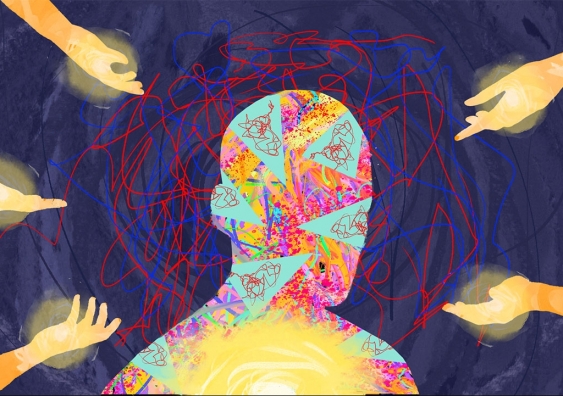Ketamine effective for treatment-resistant depression: clinical trial
2023-07-14T16:27:00+10:00

Promising results in a trial of ketamine for severe depression could lead to treatment becoming more affordable.
A low-cost version of ketamine to treat severe depression has performed strongly in a double-blind trial that compared it with placebo.
In research published today in the , researchers led by ╣·├±▓╩ã▒ Sydney and the affiliated found that more than one in five participants achieved total remission from their symptoms after a month of bi-weekly injections, while a third had their symptoms improve by at least 50 per cent. The study was a collaboration between six academic clinical mood disorder units in Australia and one in New Zealand and was funded by the Australian National Health and Medical Research Council (NHMRC).
ÔÇ£For people with treatment-resistant depression ÔÇô so those who have not benefitted from different modes of talk-therapy, commonly prescribed antidepressants, or electroconvulsive therapy ÔÇô 20 per cent remission is actually quite good,ÔÇØ lead researcher Professor Colleen Loo says.
ÔÇ£We found that in this trial, ketamine was clearly better than the placebo ÔÇô with 20 per cent reporting they╠² no longer had clinical depression compared with only 2 per cent in the placebo group. This is a huge and very obvious difference and brings definitive evidence to the field which only had past smaller trials that compared ketamine with placebo.ÔÇØ
How the trial worked
The researchers recruited 179 people with treatment-resistant depression. All were given an injection of either a generic form of ketamine that is already widely available in Australia as a drug for anaesthesia and sedation ÔÇô or placebo. Participants received two injections a week in a clinic where they were monitored for around two hours while acute dissociative and sedative effects wore off ÔÇô usually within the first hour. The treatment ran for a month and participants were asked to assess their mood at the end of the trial and one month later.
As a double-blind trial, neither participants nor researchers administering the drug were aware which patients received generic ketamine or placebo, to ensure psychological biases were minimised. Importantly, a placebo was chosen that also causes sedation, to improve treatment masking. Midazolam is a sedative normally administered before a general anaesthetic, while in many previous studies the placebo was saline.
ÔÇ£Because there are no subjective effects from the saline, in previous studies it became obvious which people were receiving the ketamine and which people received placebo,ÔÇØ Prof. Loo says.
ÔÇ£In using midazolam ÔÇô which is not a treatment for depression, but does make you feel a bit woozy and out of it ÔÇô you have much less chance of knowing whether you have received ketamine, which has similar acute effects.ÔÇØ
Other features of the recent trial that set it apart from past studies included accepting people into the trial who had previously received electroconvulsive therapy (ECT).
ÔÇ£People are recommended ECT treatment for their depression when all other treatments have been ineffective,ÔÇØ Prof. Loo says.
ÔÇ£Most studies exclude people who have had ECT because it is very hard for a new treatment to work where ECT has not.ÔÇØ
Another difference about this trial was that the drug was delivered subcutaneously (injected into the skin) rather than by drip, thus greatly reducing time and medical complexity. The study is also the largest in the world to date that compares generic ketamine with placebo in treating severe depression.
Much more affordable
Apart from the positive results, one of the standout benefits of using generic ketamine for treatment-resistant depression is that it is much cheaper than the patented S-ketamine nasal spray currently in use in Australia. Where S-ketamine costs about $800 per dose, the generic ketamine is a mere fraction of that, costing as little as $5, depending on the supplier and whether the hospital buys it wholesale. On top of the cost for the drug, patients need to pay for the medical care they receive to ensure their experience is safe ÔÇô which at Black Dog Institute clinics, comes to $350 per session.
ÔÇ£With the S-ketamine nasal spray, you are out of pocket by about $1200 for every treatment by the time you pay for the drug and the procedure, whereas for generic ketamine, you're just paying around $300-350 for the treatment including the drug cost,ÔÇØ Prof. Loo says.
She adds that for both S-ketamine and generic ketamine treatments, the positive effects often wear off after a few days to weeks, so ongoing treatment may be required, depending on your clinical situation. But the prohibitive costs of the drug and procedure make this an unsustainable proposition for most Australians.
ÔÇ£This is why we're applying for a Medicare item number to fund this treatment now, because itÔÇÖs such a powerful treatment.
ÔÇ£And if you consider that many of these people might spend many months in hospital, or be unable to work and are often quite suicidal, itÔÇÖs quite cost effective when you see how incredibly quickly and powerfully it works. WeÔÇÖve seen people go back to work, or study, or leave hospital because of this treatment in a matter of weeks.ÔÇØ
The researchers will next be looking at larger trials of generic ketamine over longer periods, and refining the safety monitoring of treatment.
╠²
Lifeline: 13 11 14╠²╠²
Suicide Call Back Service: 1300 659 467╠²╠²
Beyond Blue: 1300 224 636╠²╠²
MensLine Australia: 1300 789 978╠²╠²
╠²
Participating trial sites
- ╣·├±▓╩ã▒ / Black Dog Institute
- Royal Prince Alfred Hospital / University of Sydney
- NeuroCentrix Research Institute
- Royal Adelaide Hospital / University of Adelaide
- Monash Alfred Psychiatry Research Centre / Monash University
- University of Otago
- Gold Coast University Hospital
Institutions of non-site collaborators
- Deakin University
- University of Newcastle
- The George Institute for Global Health
- University of Western Australia
╠²
Research paper available at: https://doi.org/10.1192/bjp.2023.79





